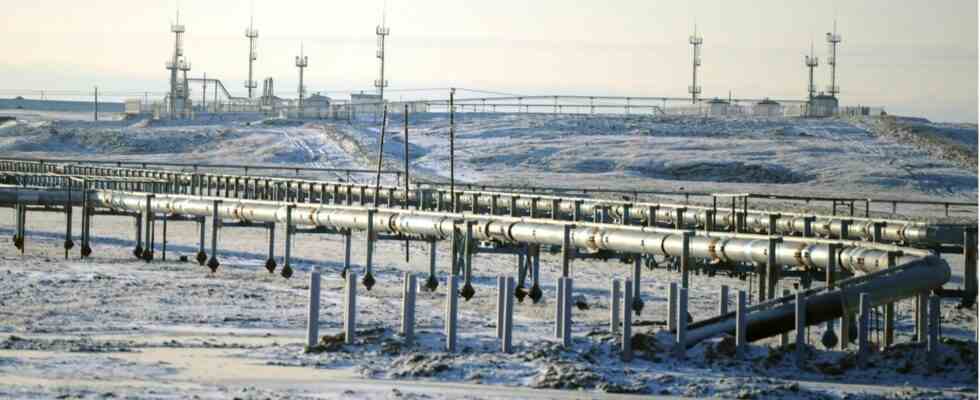power supply
Gas from the Arctic Circle: After the delivery stop for Poland and Bulgaria, the end of the Siberian Yamal pipeline is approaching
The Bovanenkovo natural gas field is one of the largest in the polar region. According to the Gazprom concern, there should be 26.5 trillion cubic meters of gas there.
© Krasilnikov Stanislav / Picture Alliance
Russia is reducing its gas supplies to the west. That could mean miles of empty pipes snaking through different countries. The Yamal pipeline is currently affected. It extends from Siberia to Germany. What are the consequences?
Hardly any people know how to name their homeland better than the Nenets on the Siberian peninsula of Yamal. Translated from the native language, Jamal means “edge of the world”. On the 115,000 square kilometer peninsula, almost 19,000 Nenets lead a nomadic life, moving with their herds of reindeer across vast white wastelands and living from fur hunting, fishing and reindeer breeding. (Of the star visited the natives of the island in 2019 – read the report here.)
The Yamal Peninsula is located above the Arctic Circle in western Siberia in the Kara Sea. The energy giant Gazprom has found a niche in the middle of this nowhere shaped by permafrost, where nature and people couldn’t be closer. The country is rich in one particular commodity that benefits all of Russia: natural gas. By 2030, 360 billion cubic meters are to be pumped from there, reports the newspaper “Le Monde diplomatique”. In the Bovanenkovo zone alone, the reserves include 4.9 trillion cubic meters. The field is one of the largest in the world. For comparison: Algeria, which is the world’s tenth largest gas producer, has more than four trillion cubic meters of natural gas at its disposal, according to expert estimates.
Natural gas was developed on Yamal back in the 1980s. Since 1999, it has flowed through the pipeline of the same name, which runs north of Moscow through Belarus and Poland. From there it crosses the Polish border. The first German station is Mallnow in Brandenburg. The 4,000-kilometer Yamal pipeline is one of three main pipelines that, among other things, supplied Germany with Russian gas and from where the raw material was forwarded to Western Europe.
Gas flow has been declining for months
At the moment, however, the pipes are empty. Hardly any gas has flowed through the pipeline to Germany since Christmas, according to figures from the Federal Network Agency, among others. But that is neither a problem nor a big surprise for Germany. The country obtains the majority of Russian gas supplies via the Transgas and Nord Stream 1 pipelines anyway.
Deliveries were stopped around the beginning of March, like the “North Courier” reported with reference to the network provider Gascade in Kassel. The company operates the Jagal pipeline, the connection to the line from Russia. A spokeswoman let it be known that the gas flow had already been very different in the weeks before. According to figures from the Brussels-based think tank Bruegel the gas flow through the pipeline has been declining since the summer of 2021. While it was previously up to 800 million cubic meters, the volume fell to almost 400 cubic meters last autumn. Gas deliveries have not exceeded 200 million cubic meters since the beginning of April. Not so with Nord Stream 1. There the gas flows had not changed significantly, Bruegel natural gas expert Georg Zachmann told the “Spiegel”.
According to the expert, the fact that deliveries have been falling for months also has something to do with the contracts that have been concluded. According to industry insiders, the contract is said to have expired last fall. The agreed purchase volumes no longer exist – which does not mean that short-term deliveries can no longer be booked.
No concerns about delivery stops
For Germany, which, according to Vice Chancellor and Economics Minister Robert Habeck, would like to drastically reduce its Russian gas supplies anyway, the delivery stop via the Yamal pipeline should have no consequences. In 2021, a good 50 percent of the gas used in Germany still came from Russia. According to Habeck, the proportion is now 35 percent. However, according to Bruegel figures, dependency is far greater in Poland (81 percent) and Bulgaria (100 percent).
In order to further reduce the share of Russian gas, countries like Germany are relying on the purchase of liquefied natural gas (LNG). This is delivered with tankers. This requires special terminals, on which the government is currently working at full speed, as Habeck assures. In the summer of 2024, only 10 percent of natural gas should come from Russia. However, the alternative is controversial because the gas is partly obtained through environmentally harmful fracking.
Poland and Bulgaria are also unconcerned about the delivery stop. Both countries have secured themselves via alternative lines. Bulgaria is currently still being connected to the Greek network. The work should be finished in June. Therefore, consumption does not have to be reduced.
Sources: Bruegel, daily News, German wave, Gascade,with material from DPA and AFP


